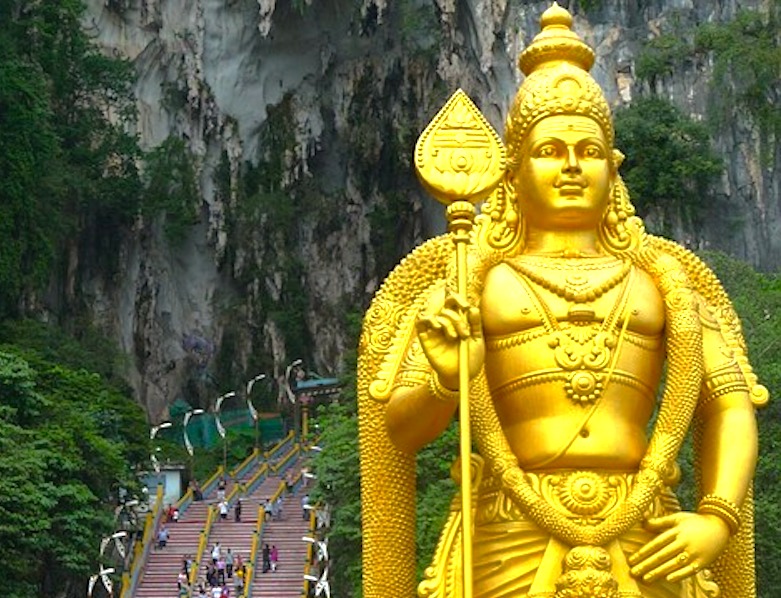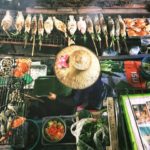Striving for Cultural Acceptance at Malaysia’s Thaipusam Festival

I went to the Thaipusam celebration to test myself. As a traveler, every day I crave new and different experiences. Culture, clothes, greetings, foods, worldviews. Some differences amaze me, inspire or surprise me, while other differences push my limits of acceptance. Everything I heard about the Thaipusam celebration suggested that it would be an intense experience of testing these limits. It is a sacred celebration that is taken out of temples onto the street. It is a raw tradition with no introduction or opening paragraph for an outside observer, to explain what’s happening.
Thaipusam is a Hindu festival celebrated by Tamil Indians in Malaysia, Singapore, Mauritius and other places, usually in late January or early February. During the festival, the Hindu god Lord Murugan is worshiped. Worshipers follow a specific diet and on the day of the festival they offer gifts to the lord. What makes the festival famous among tourists are the mysterious traditions surrounding it: intense decorations, body piercing, and walking processions that flood the streets at night. Those celebrating Thaipusam say that the festival is meant to show their love of god and that it’s open for anyone to participate in. Regardless of our beliefs, they say, we all have something to be grateful for.
I wanted to see for myself what happens, so on a Sunday morning I took a train to the Batu Caves, a short ride from downtown Kuala Lumpur. This place is an attraction on its own, even outside of festival days. The Batu Caves are natural limestone caves, with 272 stairs leading to the main grotto. Curious monkeys will probably check your pockets, and will definitely reach for your plastic bags. Scorching tropical sun will accompany you on your climb. The world’s tallest statue of Lord Murugan will silently observe you as you sweat. In other places where Thaipusam is celebrated, temples are also situated on top of hills.
The Thaipusam procession starts at night, and some walk 30-40 kilometres though the streets of Kuala Lumpur before they reach the Batu Caves. Some older people might choose to take transport all the way to the temple, and only climb the stairs at the end. Others dedicate themselves to a full night of walking with the festival procession.
Thaipusam is a Hindu festival celebrated by Tamil Indians in Malaysia, Singapore, Mauritius and other places, usually in late January or early February. What makes the festival famous are the mysterious traditions: intense decorations, body piercing, and walking processions that flood the streets at night.
As I reach the foot of the mountain, I find myself part of a chaotic march. New people arrive every moment, while others are already descending from the temple. The crowd is full of devotees, other curious Malaysians and tourists, all cheering for every next person, carrying an offering to the lord.
There are a few types of gifts worshipers can give. Women and children often carry a pot of milk decorated with an orange cloth and some flowers. They place the pot on their heads and walk silently all the way to the temple, where they pass the pot to a monk. Kavadi is another type of offering. Those are bulky metal structures, decorated with fabric, images of Murugan, shiny beads and lots and lots of peacock feathers. A construction like this can weigh anywhere between 20 and 60 kilograms, depending on one’s creativity. Men sometimes take a challenge of carrying a kavadi, symbolically offering this physical challenge as a sacrifice to the lord, on behalf of their family.
Watching the procession from outside makes me feel like I’m observing performance art mixed with an athletic competition. Families know that an athlete (a kavadi carrier) is embarking on an important and physically challenging activity, so they bring a little stool for him to rest on, wipe his sweat and help him to get ready for the climb. Before setting their foot on the stairs, some perform a dance that is welcomed by applause and cheers.
As travellers we are lucky to have many chances to observe lives of others, to discover difference and accept other’s right to choose their way of living. We have an opportunity to accept cultural differences that inspire us along with those that seem strange or unusual. Observing the Thaipusam festival was a rich experience, which other curious travellers to Kuala Lumpur–and other places where it is celebrated–will enjoy.








